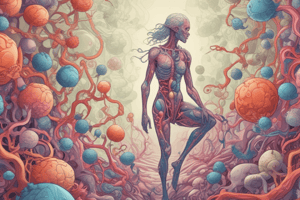Podcast
Questions and Answers
What role does the integumentary system play in the human body?
What role does the integumentary system play in the human body?
Identify the components of the skeletal system and explain its primary functions.
Identify the components of the skeletal system and explain its primary functions.
Describe the relationship between organs and tissues in the human body.
Describe the relationship between organs and tissues in the human body.
What is the primary function of the cardiovascular system?
What is the primary function of the cardiovascular system?
Explain the main purpose of the urinary system.
Explain the main purpose of the urinary system.
What are the main components of the digestive system?
What are the main components of the digestive system?
Describe the function of the respiratory system.
Describe the function of the respiratory system.
What type of tissues are involved in organs, and what role do they play?
What type of tissues are involved in organs, and what role do they play?
Flashcards
What is a cell?
What is a cell?
The basic unit of structure and function in all living organisms.
What is a tissue?
What is a tissue?
Groups of similar cells that work together to perform a specific function. For example, muscle tissue allows movement.
What is an organ?
What is an organ?
A group of different tissues working together to perform a complex function. For example, the heart pumps blood.
What is an organ system?
What is an organ system?
Signup and view all the flashcards
What is the Integumentary System?
What is the Integumentary System?
Signup and view all the flashcards
What is the Skeletal System?
What is the Skeletal System?
Signup and view all the flashcards
What is the Muscular System?
What is the Muscular System?
Signup and view all the flashcards
What is the Nervous System?
What is the Nervous System?
Signup and view all the flashcards
Study Notes
Overview of Human Organs
- The human body comprises various organs, each with specific structures and functions.
- Organs work together in organ systems to maintain homeostasis and perform complex bodily processes.
- Organs are composed of tissues, which are groups of cells with similar structures and functions.
- These tissues combine to form organs, which in turn work together in complex systems.
Major Organ Systems
- Integumentary System:
- Includes skin, hair, and nails.
- Protects the body from external factors, regulates temperature, and produces vitamin D.
- Skeletal System:
- Comprised of bones, cartilage, and ligaments.
- Provides support, protection, and movement.
- Produces blood cells.
- Muscular System:
- Consists of skeletal muscles, smooth muscles, and cardiac muscles.
- Enables movement, maintains posture, and generates heat.
- Nervous System:
- Includes the brain, spinal cord, and nerves.
- Controls and coordinates body functions.
- Enables sensation and response to stimuli.
- Endocrine System:
- Comprised of glands that produce hormones.
- Controls various bodily functions, such as growth, metabolism, and reproduction.
- Cardiovascular System:
- Composed of the heart, blood vessels (arteries, veins, capillaries), and blood.
- Transports oxygen, nutrients, and waste products throughout the body.
- Regulates body temperature.
Major Organ Groups & Functions
- Digestive System: Breaks down food into absorbable nutrients. Includes the mouth, esophagus, stomach, intestines, liver, pancreas, and gallbladder.
- Respiratory System: Allows for gas exchange (oxygen and carbon dioxide). Includes the nose, pharynx, larynx, trachea, lungs, and bronchi.
- Urinary System: Filters blood and removes waste products. Includes the kidneys, ureters, bladder, and urethra.
- Reproductive System: Enables reproduction. Includes the gonads (ovaries in females, testes in males), accessory organs, and ducts.
- Females: Ovaries, uterine tubes, uterus and vagina.
- Males: Testes, epididymis, vas deferens, seminal vesicles, prostate gland, and penis.
Key Organ Characteristics & Structure
- Organs have specific shapes and sizes suited to their functions.
- They are composed of different types of tissues—epithelial, connective, muscle, and nervous—arranged in specific patterns.
- Specialized cells within each tissue work together to perform precise functions.
- Boundaries of organs are defined by membranes (e.g., serous membranes).
Organ Dysfunction and Disease
- Damage to organs can lead to various health problems.
- Diseases can affect the structure or function of organs, sometimes requiring intervention.
- There are multiple causes of organ dysfunction: injury, infections, genetics, lifestyle factors, and aging.
- The study of organ systems is crucial for understanding human health and disease.
Studying That Suits You
Use AI to generate personalized quizzes and flashcards to suit your learning preferences.




